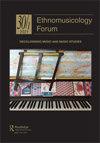“法国制造”的马里音乐:通过世界音乐节和“跨文化创作”的后殖民关系
IF 0.5
1区 艺术学
0 MUSIC
引用次数: 1
摘要
作为前法国殖民地,马里的音乐景观对法国世界音乐场景的形成做出了重要贡献,特别是从20世纪80年代开始,许多最著名的音乐家都在法国录制,演出,有时定居。在此背景下,本文通过一些主要的发展载体,包括厂牌、节日和文化机构,概述了法国的非洲世界音乐场景。通过分析展示马里音乐家的重要法国世界音乐节(如Africolor或Musiques msamutisses)的节目,并通过探索音乐合作的例子(在法国被称为“跨文化音乐创作”)来实现这一点,这些音乐合作通常在文化机构内实施,并在节日中出现。通过强调马里音乐的某些特征而损害其他特征,详细阐述了精英艺术文化是如何创造的,作者认为这些音乐作品表现出一种具有他者性的游戏,这反过来又使西方经典以赞扬马里音乐流派和乐器的名义出现。最终,这些创造性的过程——以及突出它们的话语——揭示了法国如何阐明和协商它与一些前殖民地维持的后殖民关系。本文章由计算机程序翻译,如有差异,请以英文原文为准。
Malian music ‘made in France’: postcolonial relationships through world music festivals and ‘transcultural creations’
ABSTRACT As a former French colony, Mali's musical landscape contributed in important ways to the formation of the world music scene in France, where many of its most famous musicians have recorded, performed, and sometimes settled, especially from the 1980s onwards. Drawing on this context, the essay offers an overview of the African world music scene in France through some of its main vectors of development, including labels, festivals, and cultural institutions. This is approached through the analysis of programmes from important French world music festivals showcasing Malian musicians, such as Africolor or Musiques Métisses, and by exploring examples of musical collaborations—referred to in France as ‘transcultural musical creations’—which were often implemented within cultural institutions and featured in festivals. Elaborating on how an elitist art culture was created, by stressing certain features of Malian music to the detriment of others, it is argued that these musical productions perform a play with otherness, which, in turn, has enabled western canons to take the guise of praising Malian music genres and instruments. Ultimately, these creative processes—and the discourses that foreground them—shed light on how France articulates and negotiates the postcolonial relationships it sustains with some of its former colonies.
求助全文
通过发布文献求助,成功后即可免费获取论文全文。
去求助
来源期刊

Ethnomusicology Forum
MUSIC-
CiteScore
1.10
自引率
25.00%
发文量
29
期刊介绍:
Articles often emphasise first-hand, sustained engagement with people as music makers, taking the form of ethnographic writing following one or more periods of fieldwork. Typically, ethnographies aim for a broad assessment of the processes and contexts through and within which music is imagined, discussed and made. Ethnography may be synthesised with a variety of analytical, historical and other methodologies, often entering into dialogue with other disciplinary areas such as music psychology, music education, historical musicology, performance studies, critical theory, dance, folklore and linguistics. The field is therefore characterised by its breadth in theory and method, its interdisciplinary nature and its global perspective.
 求助内容:
求助内容: 应助结果提醒方式:
应助结果提醒方式:


